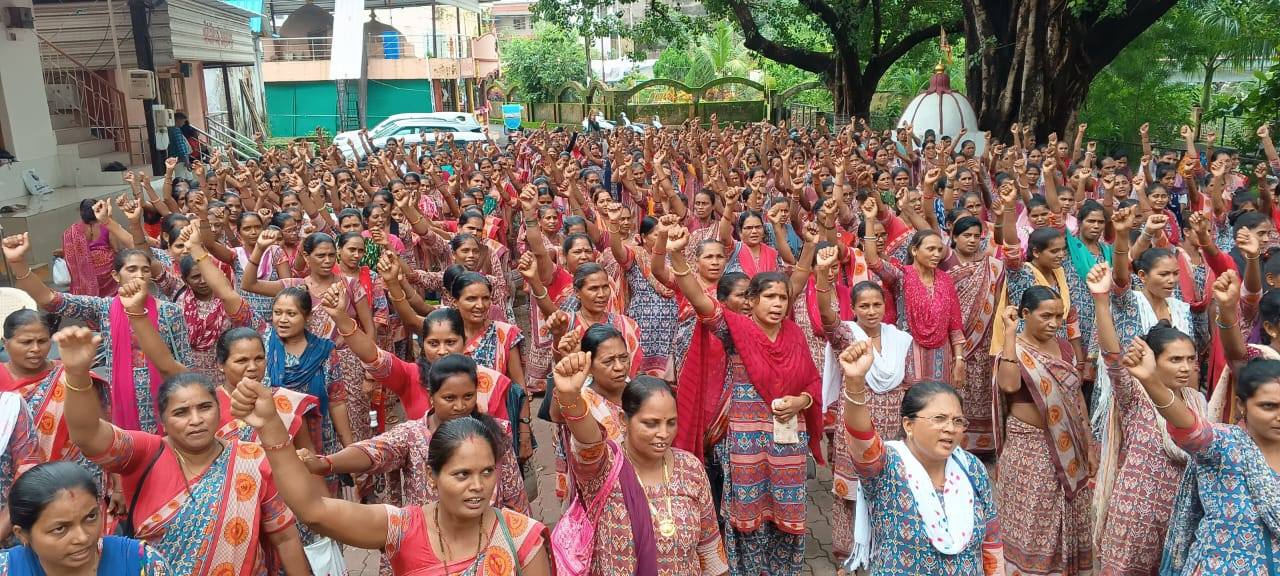
by MASHA HASSAN
Modi tera kya bharosa! (Modi, you can’t be trusted!)
Modi teri tanashahi nahi chalegi nahi chalegi! (Modi, your dictatorship will not work!)
26,000 se kum nahi! (no less than 26,000 rupees as minimum wages!)
In Gujarat’s Sabarkantha —the prime minister’s birthplace—these slogans reverberated with force. Through social media handles of Kisan Sabha (agricultural workers organisation), CITU (Centre for Indian Trade Unions) and CPIMC (communist party of India Marxist) we were able to get a glimpse of fiery fists and red flags, as hundreds and thousands of workers took to the streets all over India as a part of India’s largest general strike (Bharat Bandh) held on the 9th of July.
As expected — or perhaps, as reliably as ever — the televised mainstream media in India discovered more compelling headlines than a general strike involving 250 million people. At this stage, pointing to their silence, which almost feels ceremonial, is no longer highlighting an exception but acknowledging the default setting. However, this time there was a sliver of hope: maybe, just once, the sheer magnitude of the protests would break through. Millions in the streets —surely that would warrant a mention? How can the largest Bharat Bandh (India shutdown) be ignored? Apparently, silence after all is the safest news line.
The general strike was held as a response to the four labour codes introduced in September 2020 (now being slowly implemented by the BJP). These were presented as reforms, claiming to universalise minimum wages, ensuring timely payment of wages, promising occupational safety and better working environment —ostensibly to boost economic growth. Narender Modi tweeted on 23rd September 2020
“The labour reforms will ensure ease of doing business. These are futuristic legislations to empower enterprises…”
In reality, the four labour codes serve as a blueprint for workers’ subjugation. The Centre of Indian Trade Unions criticised the government and wrote:
“In totality, the four Labour Codes are designed to impose conditions of virtual slavery on the working people, in favour of the exploiting employers’ class”.
Twenty-nine existing labour codes have been replaced with four labour codes:
1. Code on Industrial Relations
2. Code on Wages
3. Occupational Safety, Health and Working Conditions Code,
4. Code on Social Security.
These new codes have diluted and eliminated any sort of security or statutory entitlements, such as minimum wages, fixed working hours, and job and workplace security. Evidently, the new legislation has stripped workers of their fundamental rights while handing sweeping powers to employers and bureaucrats. The Centre of Trade Unions on its website has given us a detailed analysis of these codes.
The most concerning of the new labour codes is the Industrial Relations Code, which subsumes the Trade Unions Act, the Industrial Disputes Act, and the Industrial Employment Act. This code includes several provisions that significantly simplify the procedures for retrenchment, closure, and layoffs. Workers employed in establishments with fewer than 50 employees can not only be laid off but are also denied any form of compensation. Furthermore, these new codes have expanded the word “strike” so much that peaceful protests will now be criminalised and deemed punishable. Workers who engage in any collective strike can be fined or jailed, and unions can be deregistered at will.
It was initially announced by the Union Labour Ministry that around 213 trade unions, along with the RSS* backed Bhartiya Mazdoor Sangh (BMS) – the largest Indian union close to the RSS (Rashtriya Swayamsevak Sangh, right-wing nationalist organization) will not be participating in the general strike. An article published in The Hindu newspaper quoted Central Trade Unions (CTUs) revealing how the centre is putting pressure and trying to intimidate the workers. CTU, however, made a firm statement predicting the success of the strike regardless of these intimidations.
Apart from the anti-worker codes, the arbitrary disenfranchisement is also a major issue that the migrant workers are grappling with. Maktoob Media reported from the Indian state of Odisha that 444 migrant workers were detained on suspicion of being Rohingya or Bangladeshi nationals. Those who have been detained work in construction, mining, and several other industrial units. Similarly, in the state of Bihar, Special Intensive Revision (SIR) has been implemented by the Election Commission ahead of the Legislative Assembly Elections in the state. Most migrant workers from the state of Bihar, now working in Delhi, have never heard of the new rule that requires them to re-enroll to vote. Those who have are unsure how to provide the documents the election commission demands for the SIR.
SIR is a process in which all voters in the state will have to sign enumeration forms, in duplicates, that come with their addresses, names, and printed photographs. Then, the voters must return these forms with updated photographs and proof of residence. However, those whose names were missing from the 2003 electoral rolls have to submit more documents as proof of their citizenship. Many migrant workers who were planning to go back home to vote for the Assembly elections are in a great dilemma, as they possess only two IDs that have been declared invalid by the election commission.
The Indian Express newspaper published an article on the 10th of July, which included interviews of migrant workers in Delhi, such as Dinesh Das, 35, who drives a cart delivering fruits to Asia’s largest wholesale market, Azadpur Mandi. He is a member of the Other Backward Class (OBC) and was informed about the SIR through a lawyer back home.
“The lawyer told me I need a passport, birth certificate, school marksheet, or caste certificate. I have never needed a caste certificate because I never went to school or college or applied for a job under a quota. If I were educated, would I have been pulling this cart? Where will I get these documents?” Das says.
Das also questioned the timeline. “The lawyer told me this has to be done within a month, and that I need to come home if I want my name to remain on the voter list. At this time of the year, there is decent work for me here because this is the season for mangoes and other fruits. If I go home, I will lose my earnings.”
For migrant workers from states like Bihar, voting is not just a democratic right but a crucial proof of their citizenship. Many migrant workers who come to big cities such as Delhi in search of better employment opportunities sometimes lack local documentation, such as residence proof. Therefore, participating in the electoral process and being enrolled as a voter ensures that their legal status is recognised. Being left off the rolls could mean much more for migrant workers than just the loss of a vote.
The opposition parties also called for a Bharat Bandh in protest against the ongoing SIR procedures. The trade unions, however, accused the parties of hijacking the agitation. The president of the Hind Mazdoor, Sabha Harbhajan Singh Sidhu said the INDIA BLOC has failed to mention the concerns about labour codes or their demands and has used their agitation for their own personal agenda. Sidhu further added, the opposition party could have picked another day if they wanted a “Bihar Bandh”.
Unfortunately, the strike had little to no effect in big cities such as Delhi and Mumbai. However, this lack of presence was compensated by strong participation in other parts of India, including Assam, Pondicherry, Bihar, Jharkhand, Punjab, West Bengal, Odisha, Karnataka, and many more. Kerala, the southern state, witnessed a near-total shutdown. Around 2.7 million workers from the power sector joined the strike, junior engineers, contract workers and other staff came out to protest against privatisation. Rural India saw massive mobilisations of agricultural labourers, farmers, and informal sector workers. These strikes were also joined by many students, activists and youth, with a widespread presence of women who were at the forefront of the protests. From Indian seafarers holding a red flag of the Forward Seamans Union of India (FSUI) to images of a complete shutdown at Coal India Ltd, these nationwide strikes demonstrated a powerful show of determination and solidarity amongst workers and farmers from various sectors. The strike is not seen merely as a protest against labour laws, but as a broader expression of the prevailing economic conditions and the beginning of a larger struggle. The slogan Abhi toh angdayi hai…Aage aur ladai hai (This is just the first stir…there’s a greater struggle to come) echoed and captured the mood of the strikes—a symbolic signal that this is just the beginning.





